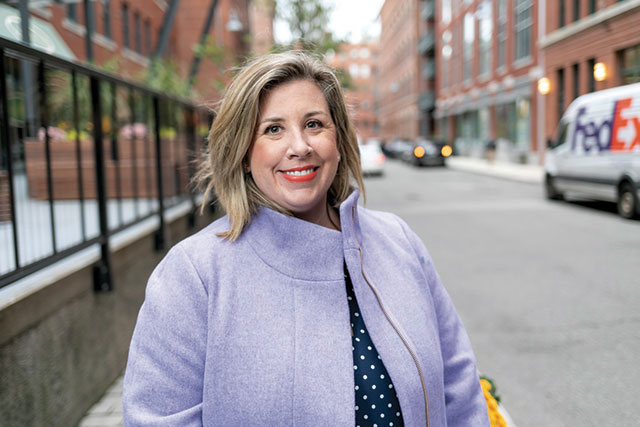 DEGREES: B.A. in English; M.Ed. in early childhood development, Lesley University
DEGREES: B.A. in English; M.Ed. in early childhood development, Lesley University
JOB TITLE: Author; director of training curriculum for social-skills development
FAVORITE TRINITY MEMORY: Exiting the dining hall, gazing upon the blazing sky in front of the bishop statue with friends, and realizing that this was home.
You authored the book Why Will No One Play with Me? What sparked your interest in writing it? Running a social-skills group as a clinician, I was frequently asked by children, “Why will no one play with me?” Boy, is that sad! Playdates are creating socially isolated children earlier than in my generation. Many of the kids with social-skills challenges could be diagnosed with learning differences, but without a diagnosis, they aren’t receiving needed social-skills supports. Parents are at a loss, and, since resources are hard to find, are left to their own good intentions or to mistakenly assume that their child is just awkward, shy, or a bit “too much.” I saw the need to create a guidebook to help parents help their child. Getting a big publishing deal took years, but every time I wanted to give up, a parent would plead that I stay in the game to help other parents all over the world. I am blessed that parents tell me I am answering their social challenges.
What advice would you give to parents to help their children stay in contact with their friends through the COVID-19 pandemic? Help your child understand the importance of social outreach. Collaborate on creating a daily schedule that includes exercise, screen time, family participation, chores, homework, and friends. An important centerpiece of my book is the coaching communication template that demonstrates how to talk about anything.
What advice do you have for parents during this unprecedented time? Although this is a social isolating crisis, use this time to build valuable life skills. Social skills are life skills, and parents are their child’s most important model. Here are some suggestions:
- Dine together. Ask, “What are the sunny parts and what are the cloudy parts of your day?” Prompt everyone to make eye contact, to listen to one another, and to respond and engage. Promote empathy by stepping into one another’s shoes.
- Promote chitchat. Creating a reciprocal back-and-forth conversation is a key social skill. Introduce a conversation topic, and each time your child builds on the topic, your child can add blocks or a Jenga piece or return a table-tennis serve. This visual representation demonstrates how each comment builds on the last.
- Be a good winner and a good loser. When emotions run high, kids get upset, storm off, or gloat. Notice when your child’s emotional reaction is becoming exaggerated, and interrupt it with a coaching cue. Draw attention to your child’s emotional state and to the power to make a choice. Collaborate on strategies for the next time this happens.
- Work on sharing. Compromise and collaboration are key social skills. In this exercise, mix two puzzles so each person has one or two pieces of the other’s puzzle. Let each realize that without cooperating, neither will complete the puzzle.
- Un-structure playtime. Past generations developed social skills because there were few to no agenda requirements. Use COVID-19 to reset toward a play-centered lifestyle to teach communication, collaboration, compromise, creativity, and problem-solving.
How did your time at Trinity prepare you for the work you do? As The Trinity Tripod news editor, I interned at The Hartford Courant. Both experiences improved my writing abilities and also taught me to work with teams, influence people, and master research. These skills have been invaluable in my life!
What was the most memorable course you took at Trinity? “Russian Studies” with Professor Sam Kassow because I learned how to analyze a problem and bring forth an argument. I still carry these skills with me.
Did you have a professor who was particularly influential? Dean David Winer said I was a “force of nature” and helped me cultivate my intellectual curiosity and desire to pursue my dreams. I’ve been in touch with Dean Winer every step of my life since.
What other reflections about college would you like to share? Trinity was everything I wanted in a college: a place to explore my gifts, to work in teams, and to connect with like- and unlike-minded friends. I met my husband at Trinity, and we now have two wonderful children, the younger named Finnian Trinity della Penna. Trinity taught me that I can harness my strength to make anything happen.
